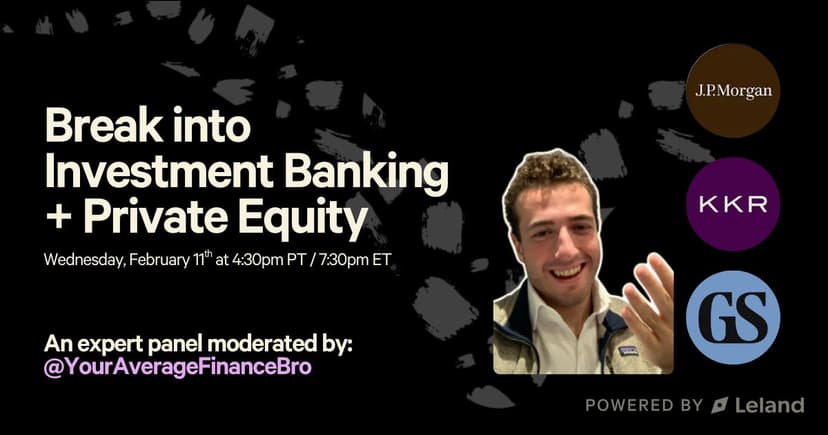The 10 Best Questions to Ask Your Interviewer in a Private Equity Interview
Want to stand out in your private equity interview? Here are 10 smart, strategic questions to ask your interviewer that show you're prepared, insightful, and serious about the role.
Posted July 30, 2025

Join a free event
Learn from top coaches and industry experts in live, interactive sessions you can join for free.
Table of Contents
Asking smart questions during a private equity interview isn't just a formality. It can shape how you're perceived and whether you're a serious fit for the role. The best questions show that you understand how private equity firms typically operate, how deals are sourced and executed, and how culture and expectations differ between funds.
In this article, I’ll walk through 10 specific questions that signal preparation, strategic thinking, and long-term intent. These questions reflect current trends in the private equity industry and align with what leading private equity firms are looking for.
Why Asking the Right Questions in a Private Equity Interview Matters
Good questions reflect your understanding of the private equity interview process and help position you as someone who knows the industry. Whether you’re coming from investment banking, consulting, or an MBA program, showing depth is critical. Here’s what thoughtful questions accomplish:
- Signal awareness of the firm’s investment strategy and track record
- Reveal your interest in the firm's culture, including its core values, diversity, and inclusivity, as well as deal flow and portfolio companies
- Give you insight into job responsibilities, growth paths, and work-life balance
Asking thoughtful questions can also provide valuable insights into the firm's hiring process and expectations. Private equity investors want to work with professionals who understand deal dynamics and can build value post-acquisition. Your questions should reflect that.
How to Approach Asking Questions During the Interview
Timing Your Questions
You’ll usually get the opportunity to ask questions at the end of the interview. In some interviews, there may be room for dialogue throughout. Either way, it’s best to ask the more personal or strategic questions near the end once the interviewer has shared their own background and firm perspective.
Avoid questions about compensation, carried interest, or work-life balance unless the interviewer brings it up or you’re at the final stages of the interview process.
Tailor Your Questions Based on the Interviewer
| Interviewer Level | What to Ask |
|---|---|
| Associate | Ask about training, balance sheet work, financial modeling, and their own path |
| VP | Ask about investment strategy, the firm's approach to deals, investment opportunities, deal exposure, and job responsibilities |
| Partner | Ask about market trends, capital structure, the firm's approach to identifying and evaluating investment opportunities, and the firm’s future strategy |
Note: Avoid surface-level questions that show you haven’t researched the firm. PE interviewers expect candidates to know the firm’s investment strategy, fund size, and industry focus. Understanding the firm's investment strategy is crucial when preparing thoughtful questions.
The 10 Best Questions to Ask in a Private Equity Interview
Each of these questions is designed to help candidates stand out among private equity professionals by demonstrating commercial awareness, strategic thinking, and cultural alignment. They also provide an opportunity to show your understanding of the strategic rationale behind private equity deals. Ask them with a purpose. Use follow-up questions to create a thoughtful dialogue.
1. How does your firm differentiate itself in sourcing proprietary deals?
Why this matters:
Proprietary deal flow is a major differentiator among private equity firms. It speaks directly to sourcing strategy, relationship-building, and long-term investment discipline. PE firms typically rely on intermediaries like investment bankers, but the strongest firms build networks with business owners, operators, and industry advisors to find off-market deals.
What it reveals:
- Whether the firm is banker-dependent or outbound-driven
- How competitive their sourcing funnel is
- If you participate in deal origination efforts
Follow-up ideas:
- “Do associates play any role in sourcing or outreach?”
- “Have you recently won a deal in a competitive process?”
- “How do you measure sourcing success internally?”
2. What characteristics do your most successful associates share?
Why this matters:This shows you're not only trying to get the job, you're thinking about how to succeed in it. It signals you’re coachable, self-aware, and aligned with the firm’s internal bar.
What it reveals:
- Which traits are rewarded (analytical rigor, autonomy, reliability, initiative)
- What gets someone promoted or trusted with more responsibility
- Cultural norms around ownership, feedback, and communication
Follow-up ideas:
- “Are there structured performance benchmarks, or is it more informal?”
- “Do strong performers typically work across deals or specialize early?”
3. How involved are associates in portfolio company operations post-deal?
Why this matters:
Most candidates focus on the pre-close side, sourcing, due diligence, and modeling. But the real value in private equity is often created post-close. Asking about this shows interest in the full investment lifecycle and how value is driven in portfolio companies.
What it reveals:
- Whether you’ll work directly with management teams
- How the firm thinks about operational improvements
- The presence of operating partners or transformation teams
- If associates are involved in analyzing the performance of the acquired company post-deal, such as cash flow analysis and supporting leadership evaluation
Follow-up ideas:
- “Are associates staffed on key strategic initiatives post-close?”
- “How often do investment team members visit portfolio company sites?”
4. Can you walk me through a recent deal and what made it attractive?
Why this matters:
This question tests your ability to discuss real investments with nuance. It moves the conversation from theory to practice and allows you to understand how the firm defines a good deal, from investment rationale to valuation discipline.
What it reveals:
- The firm’s underwriting philosophy
- How do they weigh qualitative vs. quantitative factors
- If they're leaning into growth equity, buyouts, special situations, etc.
Follow-up ideas:
- “Was the investment thesis focused on revenue growth, margin expansion, or market share?”
- “What did the capital structure look like?”
- “How did you get conviction on free cash flows or enterprise value?”
5. How is feedback given and performance evaluated at your firm?
Why this matters:
This question reflects maturity and long-term thinking. It positions you as someone who wants to improve continuously, not just hit technical benchmarks. Private equity firms vary widely, some have structured review processes, while others rely on informal feedback loops.
What it reveals:
- How transparent the evaluation process is
- Whether performance is tied to deal outcomes, sourcing, or team collaboration
- If there are ongoing coaching mechanisms or formal reviews
Follow-up ideas:
- “Do associates get mid-year check-ins or only annual reviews?”
- “Are there feedback loops during active deals?”
6. What’s the typical career path for someone in this role?
Why this matters:
Some PE firms have fixed-term programs. Others offer direct promotion paths to VP or Principal roles. Knowing this helps you decide if the job fits your long-term plan, whether that includes an MBA, a longer PE trajectory, or a hybrid path.
What it reveals:
- Promotion timelines and expectations
- Whether the firm expects MBA exits or offers internal advancement
- Transparency around career development
- Whether associates have transitioned to roles in venture capital after their time at the firm
Follow-up ideas:
- “Are there direct promotions from associate to senior associate or VP?”
- “Have any recent associates moved into portfolio company roles?”
7. How do you think the current market environment is impacting your investment strategy?
Why this matters:
Asking this shows you’re thinking about private equity as a function of broader macro and financial conditions, interest rates, debt availability, valuations, geopolitical risk, and industry-specific trends. Understanding industry trends is crucial, as they directly impact investment decisions and the strategies firms use to adapt. It’s a strong question to ask Partners or MDs.
What it reveals:
- The firm’s outlook on capital markets and fundraising
- Whether they’re shifting sectors or deal sizes
- If there’s an appetite for raising debt or using more equity financing
- How the firm assesses financial stability when making investment decisions in a changing market
Follow-up ideas:
- “Have your leverage ratios changed in recent deals?”
- “Are you seeing more structured equity solutions or seller financing?”
8. What does collaboration look like between deal teams and portfolio company management?
Why this matters:
This highlights your interest in how firms drive real change in acquired companies. Leading private equity firms create value not just through financial engineering but by improving operations, talent, and strategy. Collaboration with management teams is at the core.
What it reveals:
- The firm’s involvement in key decisions post-acquisition
- If they empower portfolio companies or micromanage
- The use of operational advisors or internal value creation teams
- The firm's role in driving growth initiatives and improving supplier contracts in portfolio companies
Follow-up ideas:
- “Are investment professionals expected to join board meetings?”
- “How are decisions shared between deal teams and CEOs/CFOs?”
- “Do associates participate in renegotiating supplier contracts as part of operational improvement projects?”
9. How does the firm support professional development or industry exposure?
Why this matters:
This positions you as someone who wants to grow with the firm through mentorship, thought leadership, or peer learning. Many PE firms operate lean, and not all invest in internal development, so this also tells you how they view human capital.
What it reveals:
- Availability of training, conferences, and knowledge-sharing
- Mentorship culture, formal or informal
- Whether there’s a focus on building future partners or short-term execution
Follow-up ideas:
- “Do associates attend industry events or network with lenders/operators?”
- “Are there internal sessions for deal reviews or case studies?”
10. What’s something you personally enjoy about working here?
Why this matters:
This may seem basic, but it’s often the most revealing. It prompts a candid response and gives you a sense of firm values, working style, and team dynamics. It also builds rapport and helps shift the conversation to a more human level.
What it reveals:
- What insiders value most (deal quality, team, flexibility, culture)
- Whether they believe in the mission or are just going through the motions
- Red flags, if the interviewer struggles to answer
Follow-up ideas:
- “Is that clear to you when you joined?”
- “Do others at the firm share that perspective?”
Questions to Avoid Asking
Avoid questions that show poor preparation, focus too much on personal gain, or attempt to show off technical knowledge you can’t defend.
| Question | Why It’s a Red Flag |
|---|---|
| “What does your firm do?” | Signals no research or awareness of firm knowledge |
| “What’s the salary or carry structure?” | Premature unless you’re at the offer stage |
| “Can you explain how net present value works?” | Misfires if you can’t back it up with solid financial modeling |
| “How much leverage do you use in deals?” | Too abstract unless tied to a relevant case or example |
The Bottom Line
Asking the right questions in a private equity interview isn’t about checking a box; it’s about showing that you think like an investor. Great candidates use this time to probe into how deals are sourced, what makes a company worth acquiring, and how value is actually created post-close. They don’t just ask about the work; they ask about outcomes, culture, and growth. Your questions should reflect a deep understanding of what makes private equity unique: long-hold periods, concentrated portfolios, and operational levers that drive returns.
When you ask about market conditions, investment rationale, or what separates top performers at the firm, you're signaling that you're not just looking for a job; you’re thinking like someone who could one day sit on the other side of the table.
Work With a Private Equity Interview Coach Today
If you’re aiming to break into private equity, working with someone who’s been through the process at a leading firm can make a real difference.
Preparation for private equity interviews differs from investment banking interviews, as private equity interviews emphasize technical skills like Paper LBOs and debt stress-testing, while investment banking interviews focus more on fundamental technical questions, such as LBO modeling and advanced financial analysis, along with different behavioral expectations. Leland connects you with coaches from top private equity firms across mega funds and top middle-market shops, who know exactly what it takes to succeed.
Whether you’re coming from investment banking, consulting, or corporate finance, personalized coaching can help you master technical questions, behavioral interviews, and deal walk-throughs.
You can also:
- Read verified reviews from successful candidates
- Join free private equity events to hear from coaches and stay sharp
- Book a free call with a Leland advisor to find the right coach or resource for your interview process
Read these next:
- How to Ace Your TA Associates PE Interview
- How to Get Into Private Equity: The Ultimate Guide
- 10 Finance Internships for Freshmen in College
- What to Ask Your Private Equity Interviewer
- Top Skills You Need to Break Into Private Equity
How Does Private Equity Work? – FAQs
What are good questions to ask during a private equity interview?
- Ask about fund strategy, portfolio company involvement, team dynamics, deal exposure, and professional growth opportunities. You can also inquire about the significant amount of debt typically used in a leveraged buyout and how the firm approaches structuring these transactions.
When should I ask about compensation or carried interest?
- Wait until later interview rounds or after you’ve received an offer. Asking too early can signal misaligned priorities. Focus first on understanding the role, firm culture, and expectations.
What if I don’t have a strong background in private equity?
- Focus on demonstrating your interest in the private equity fund’s strategy, and align your past experience from investment banking or consulting. Learn how a private equity fund or PE firm evaluates deals, including leveraged buyouts and initial public offering strategies.
How can I prepare for private equity interview questions?
- Work with a coach, research the firm’s investment strategy, and practice behavioral and technical questions. Review free cash flows, net income modeling, and strategic buyer rationale. Practice questions about leveraged buyout modeling, debt financing, and interest expense calculations. As part of your technical preparation, make sure you understand debt capacity and dividend recapitalization and how they impact private equity transactions.
What topics should I avoid asking about in a first-round interview?
- Avoid asking about equity splits, balance sheet access, or internal metrics like net present value unless it’s directly relevant.
Browse hundreds of expert coaches
Leland coaches have helped thousands of people achieve their goals. A dedicated mentor can make all the difference.




















